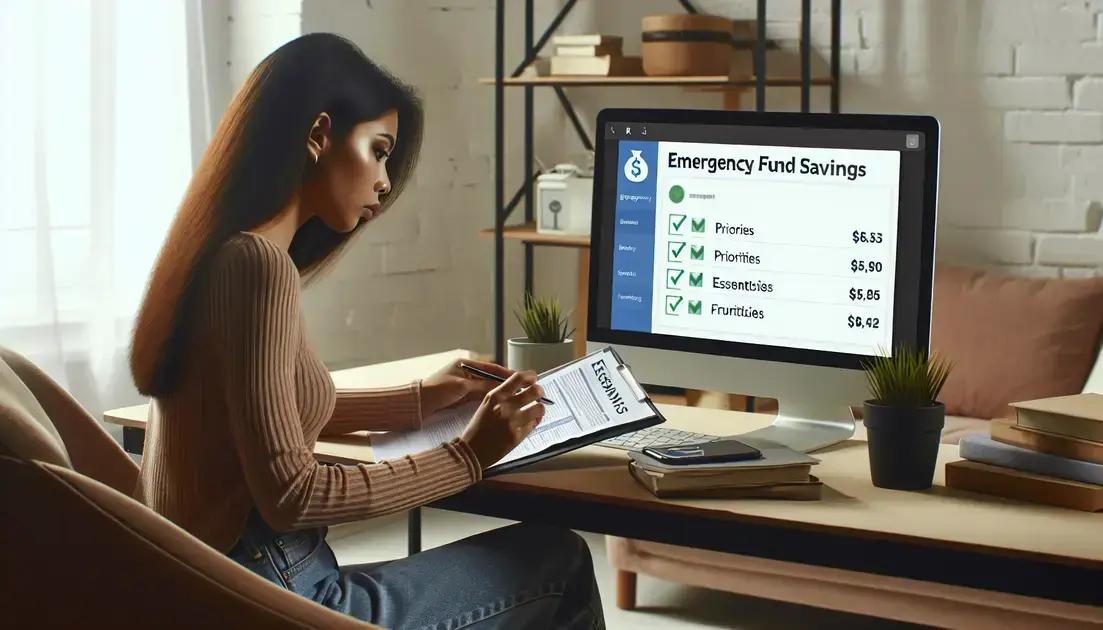Why do you need an emergency fund?
An Emergency Fund is essential for financial security. It serves as your safety net in times of unexpected expenses, ensuring you remain afloat. This article dives into why having an Fund is crucial, how much you should save, and the best strategies to build yours effectively. Let’s explore the steps to achieving peace of mind during uncertain times!
What is an Emergency Fund?
An Fund is a critical savings account set aside for unplanned costs or financial emergencies. This fund acts as a financial cushion, helping you manage expenses that can arise unexpectedly, such as medical bills, car repairs, or job loss.
Importance of an Emergency Fund
Creating an Fund allows individuals to navigate life’s uncertainties without falling deep into debt. Having this safety net ensures that you can cover necessary expenses without relying solely on credit cards or loans, which can lead to long-term financial stress.
How an Emergency Fund Works
When you set up an Fund, you typically aim to save enough money to cover three to six months’ worth of living expenses. This amount varies depending on your individual needs; for some, a larger amount may provide additional peace of mind.
Where to Keep Your Emergency Fund
Your Emergency Fund should be easily accessible but not too easy to spend. Consider keeping it in a high-yield savings account that offers quick access without penalties. This way, you can earn some interest while ensuring you have the funds available if an emergency arises.
By prioritizing the establishment of an Fund, you can mitigate financial risks and prepare yourself for unexpected challenges. Embracing this savings habit can lead to greater financial stability and confidence in the long run.
How Much Should Your Emergency Fund Be?

Determining how much your Fund should be is essential for financial security. A common guideline is to save three to six months’ worth of living expenses. This range can vary based on personal circumstances like family size, job stability, and health status.
Factors to Consider
Your unique situation plays a crucial role in deciding the amount for your Fund. If you have a stable job and no children, you might aim for the lower end of the range. Conversely, if you have dependents or work in a volatile industry, aiming for six months or even more may be wise.
Calculating Your Expenses
To establish your ideal amount, begin by calculating your monthly expenses. Include rent or mortgage, utilities, groceries, transportation, and insurance. By understanding your total monthly spending, you can multiply that amount to determine your target Fund size.
New Financial Responsibilities
Significant life changes, such as starting a family or switching careers, can impact your fund size. As these changes occur, reassess your Fund to ensure it meets your evolving needs. Maintaining an adequate fund can help you face unexpected events without financial strain.
Having the right amount saved in your Emergency Fund not only promotes financial confidence but also prepares you for whatever life may throw your way. This proactive approach can aid in navigating unexpected challenges smoothly.
Best Ways to Build Your Emergency Fund
Building your Fund may seem daunting, but with a structured approach, it can become manageable. Here are some practical steps to help you create a solid fund.
Set a Savings Goal
Start by deciding how much money you want to save. This amount should be based on your monthly expenses multiplied by the number of months you aim to cover. Having a clear savings target will motivate you to stay focused on your goal.
Create a Budget
Developing a budget is essential for finding extra money to save. Track your income and expenses to identify areas where you can cut back. Consider reducing non-essential spending, such as dining out or subscriptions. Allocate these savings directly to your Fund.
Automate Your Savings
Consider setting up automatic transfers from your checking account to your Fund account. Automating this process makes saving effortless and ensures that you consistently contribute to your fund. Even small, regular deposits can add up over time.
Use Windfalls Wisely
Whenever you receive unexpected money, like a tax refund or a bonus, consider depositing a portion into your Fund. This can give your savings a quicker boost and help you reach your goal faster.
By following these strategies, you can build an Fund more effectively. Stay committed, and soon you will have a financial cushion ready for any unexpected expenses that come your way.
Using Your Emergency Fund Wisely

Knowing how to use your Emergency Fund wisely is just as important as building it. Making informed decisions can help you navigate financial challenges without falling into debt.
Assessing the Situation
Before tapping into your Emergency Fund, carefully assess your situation. Determine if the expense is truly an emergency. Unexpected medical bills, urgent car repairs, or job loss may justify using your savings, while non-essential purchases should be avoided.
Prioritize Essential Expenses
When using your Emergency Fund, prioritize essential expenses. Focus on necessary costs such as housing, food, and healthcare. By covering these basics, you can manage through difficult patches without excessive worry.
Consider Replenishing It
After using funds, make it a priority to rebuild your Emergency Fund. Set a timeline for how quickly you want to replenish it. Determine how much you can save monthly and stick to that plan until your fund is back to its original level.
Avoid Frequent Withdrawals
Resist the temptation to dip into your Emergency Fund for regular expenses. This fund is meant for genuine emergencies, and using it frequently may lead to insufficient savings when you really need access to funds.
Using your Emergency Fund wisely is key to ensuring that it remains a reliable financial safety net. By following these tips, you can navigate unexpected situations without compromising your financial health.
Building Your Financial Future with an Emergency Fund
An Emergency Fund is not just a safety net; it’s a crucial component of a healthy financial future. By setting a clear savings goal, budgeting wisely, and building your fund consistently, you can prepare for the unexpected.
Understanding how much to save, what qualifies as an emergency, and using your funds wisely ensures that you can navigate financial challenges without undue stress. This proactive planning leads to financial peace of mind.
Ultimately, an Emergency Fund empowers you to face life’s uncertainties with confidence, making it an essential goal for everyone striving for financial stability.




